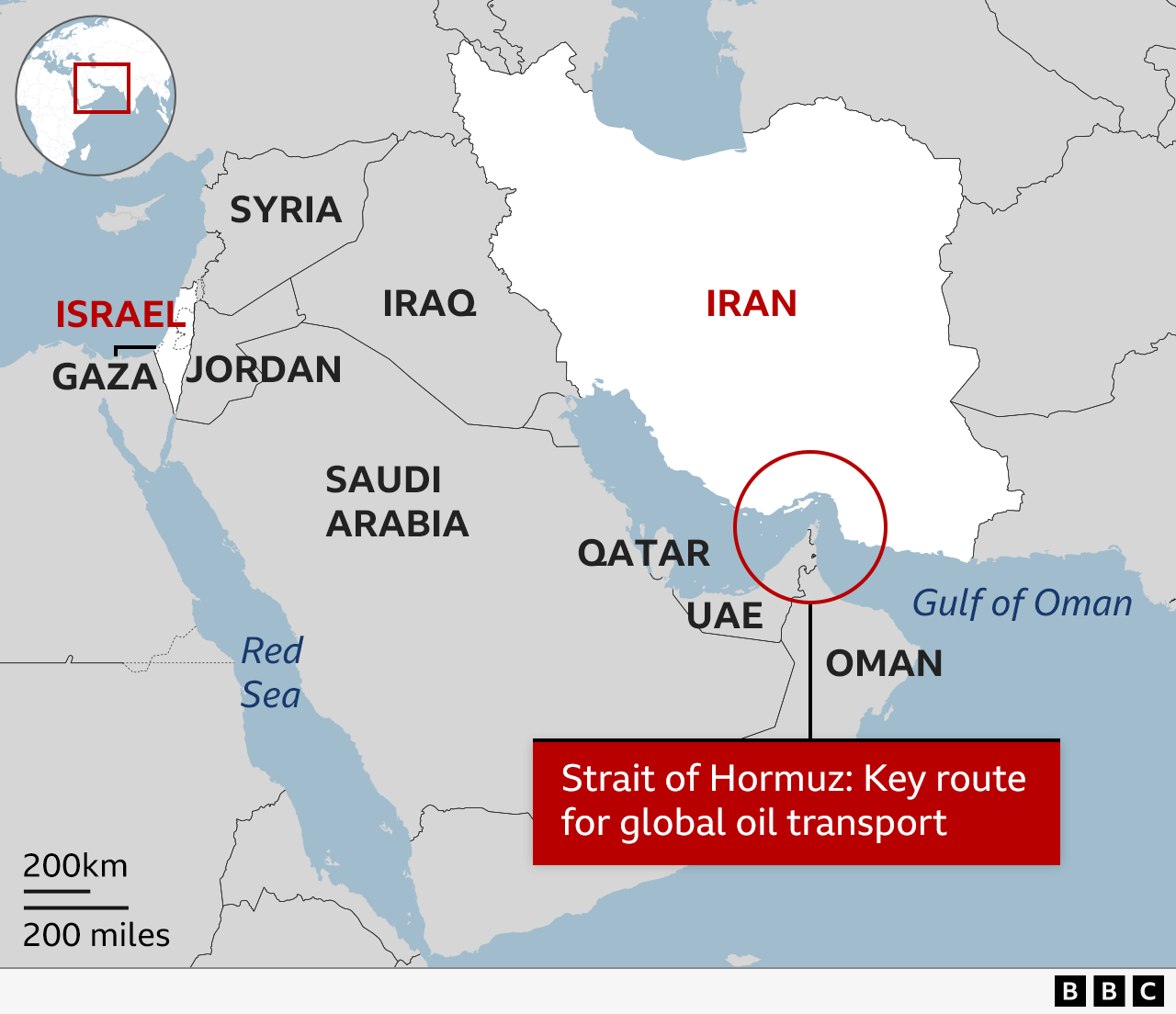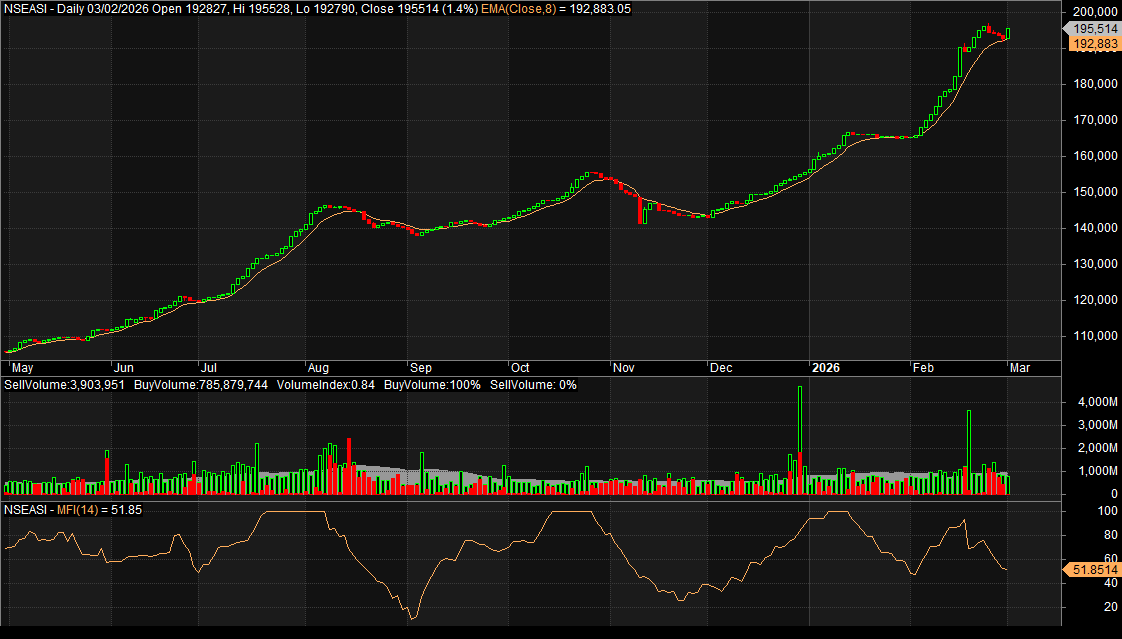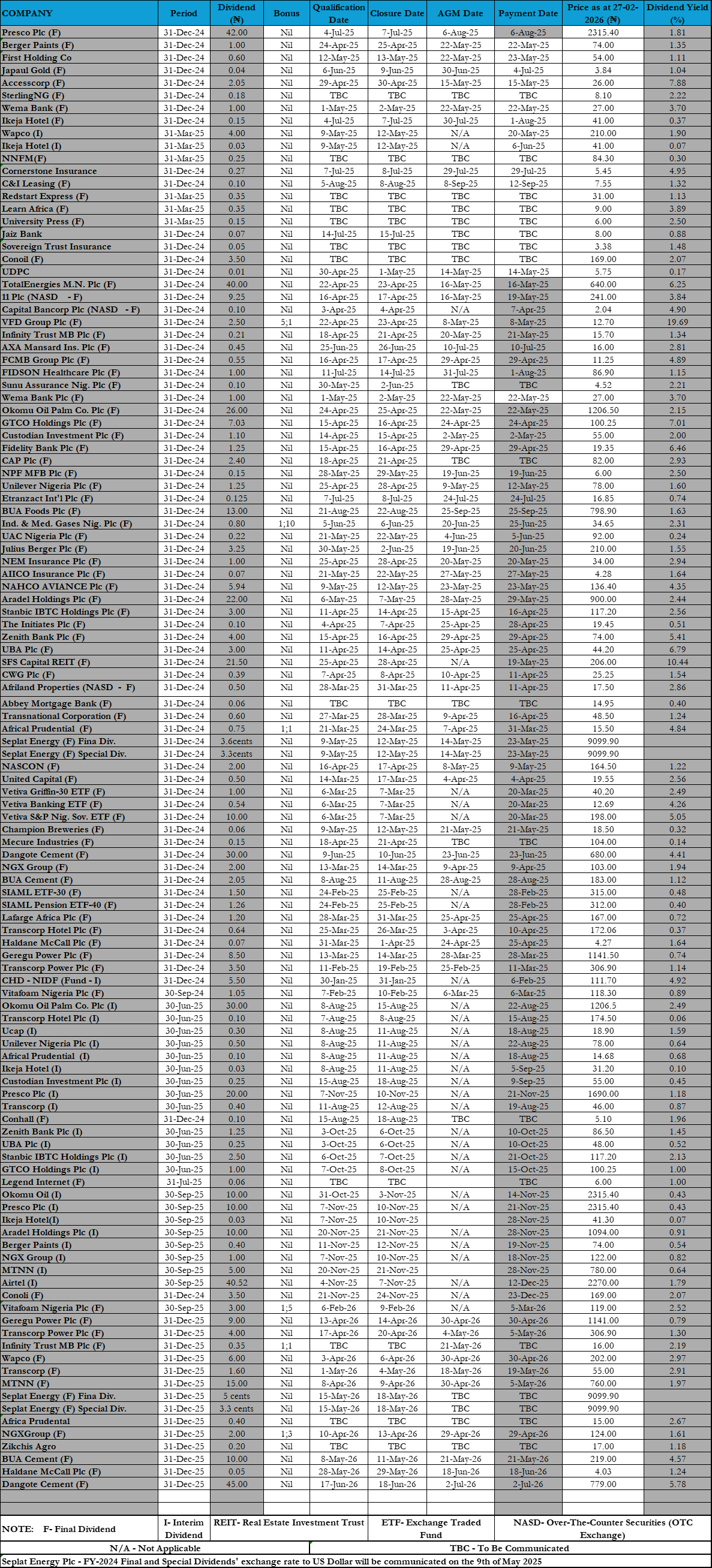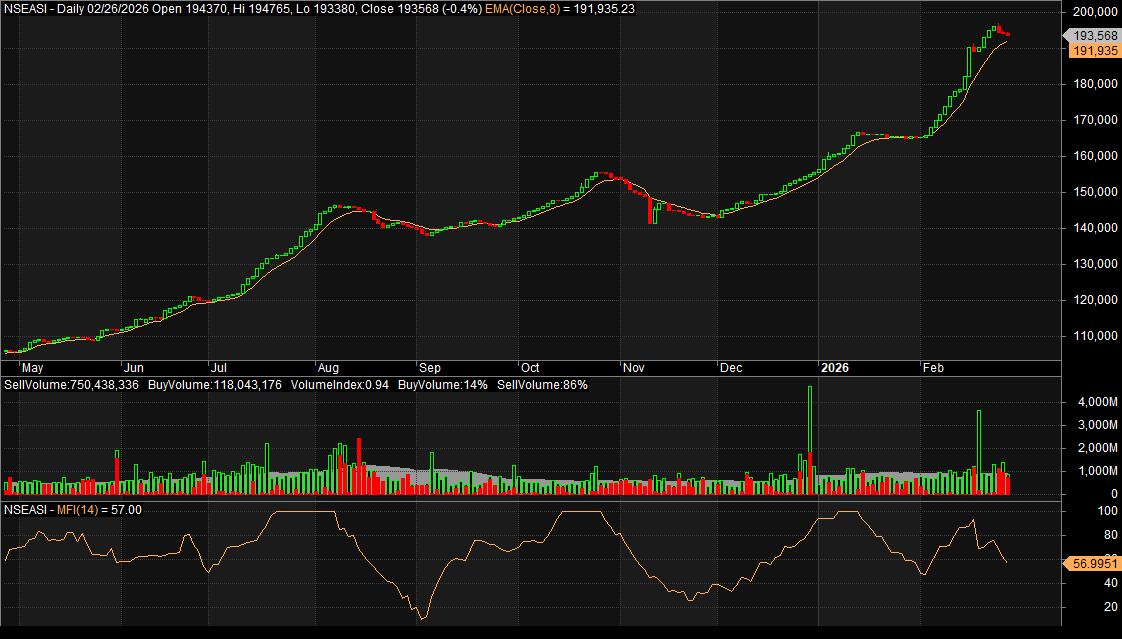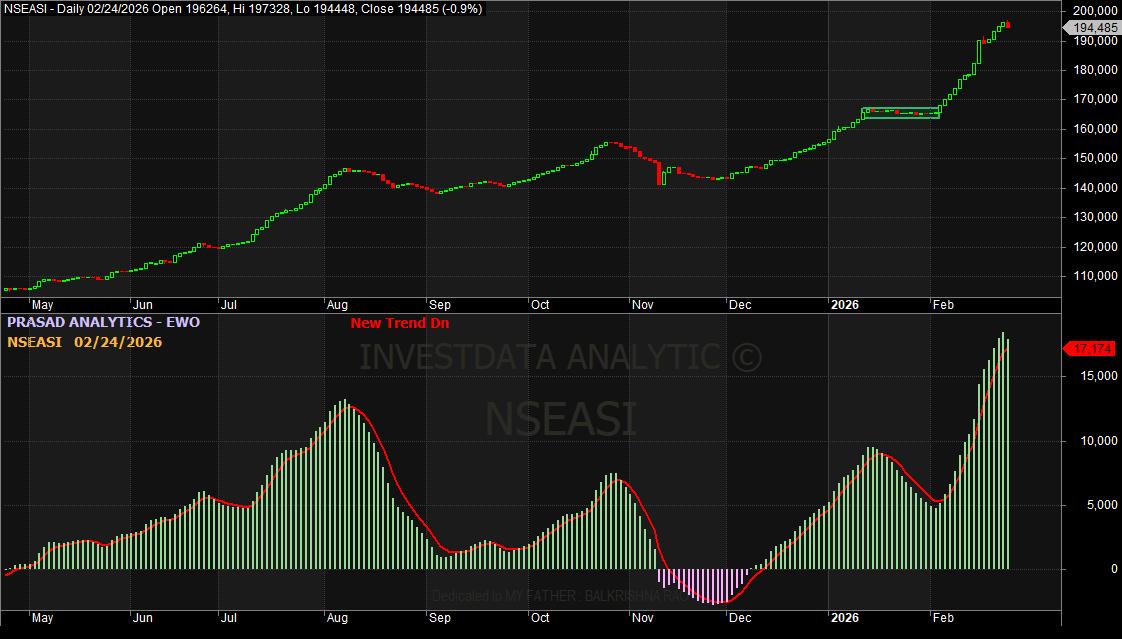
Market Update For November 19, 2025
The Nigerian equities market remained under pressure on Wednesday, with investor sentiment largely cautious as profit-taking continued across several bellwether counters. Following a period of strong year-to-date gains, market participants appeared focused on consolidating profits while reassessing valuations in the context of both domestic and global developments. Trading activity was marked by a selective approach, with liquidity concentrated in high-volume, high-value stocks, even as broader market indices experienced modest declines.
The All-Share Index (ASI) edged lower, reflecting the cautious mood that prevailed across most sectors. While select stocks delivered positive returns, the overarching market environment was dominated by investors managing risk amid uncertainty. Key financial and consumer stocks witnessed significant turnover, highlighting a market preference for counters with high liquidity and perceived resilience. ACCESSCORP, in particular, emerged as the most actively traded equity, dominating both volume and value for the day. TANTALIZER and JAPAULGOLD also recorded meaningful participation, underscoring investor confidence in certain mid-cap and consumer-focused counters despite the broader retreat.
Market Activity and Sector Performance
Financial stocks continued to exert considerable influence on market direction. Leading banks and financial institutions, including ZENITHBANK, UBA, GTCO, and ACCESSCORP, faced notable selling pressure as profit-taking intensified. Investors appeared to adjust positions in response to recent rallies, realigning portfolios in preparation for potential volatility in the short term. The decline in large-cap financial stocks contributed significantly to the overall dip in market indices, reflecting the weight these counters carry in the ASI calculation.
Consumer goods stocks displayed a mixed performance during the session. While high-volume trades in TANTALIZER suggested sustained investor interest, other major consumer stocks such as GUINNESS and DANGSUGAR experienced declines, indicating that profit-taking was not limited to financial counters alone. NEM, a leading cement company, also declined, reflecting investor caution across industrials. These movements highlight the selective nature of investor activity, with capital flowing toward counters exhibiting resilience or attractive valuation, while profit-taking dominated weaker-performing or overbought equities.
The energy sector, particularly oil-linked equities, remained sensitive to global developments. Oil prices recorded a sharp decline during the day, with Brent crude down 2.65% to $63.17 per barrel and West Texas Intermediate (WTI) retreating 2.72% to $59.09 per barrel. The decline was influenced by reports suggesting potential progress in U.S.-driven diplomatic efforts to end the Russia-Ukraine conflict, alongside continued oversupply concerns. Market participants remain attentive to developments in the global oil market, as any reduction in geopolitical risk or oversupply could weigh on oil-linked equities, while persistent uncertainty may sustain volatility in energy-related stocks.
Trading Volume and Liquidity Dynamics
Liquidity dominated trading considerations for mid-week investors, with total market volume surging 134.12% to 892.53 million shares valued at N23.54 billion across 20,225 deals. ACCESSCORP accounted for the lion’s share of activity, representing 54.72% of total volume and 44.90% of total value traded. Its dominance underscores the market’s reliance on highly liquid counters for price discovery and risk management amid broader market weakness. TANTALIZER and JAPAULGOLD followed in terms of volume contribution, accounting for 7.94% and 6.06% respectively, while ARADEL and ZENITHBANK trailed in value contribution.
The concentration of trading in a handful of high-liquidity counters suggests that investors are exercising caution, preferring to rotate capital within known, stable equities rather than spreading exposure across more volatile or thinly traded stocks. This behavior is consistent with market patterns observed during periods of consolidation, where participants seek to mitigate risk while remaining engaged in the market.
Technical Analysis, Short-Term Outlook
From a technical perspective, the ASI closed below its short-term moving averages, reflecting ongoing bearish momentum. Support levels for the index are identified at 144,000 and 143,200 points, while immediate resistance sits near 145,200 points. The market’s inability to sustain gains above these levels indicates that profit-taking continues to be the dominant driver of price action.
Despite the prevailing bearish tone, pockets of opportunity remain. NCR, for example, traded above its 52-week high at N34.00, suggesting continued accumulation in mid-cap counters with strong fundamentals. Similarly, TANTALIZER maintained robust trading volumes, reflecting selective investor interest and the potential for tactical buying. These counters illustrate the market’s nuanced behavior, where investors balance risk management with opportunities in equities that demonstrate resilience or positive momentum.
The outlook for the remainder of the week suggests a continuation of cautious trading. Investors are expected to monitor domestic economic indicators, corporate earnings releases, and global market developments, particularly in the oil market, to inform portfolio adjustments. While broad-based gains may remain limited, strategic accumulation in high-liquidity, fundamentally strong counters could provide avenues for incremental returns amid overall market consolidation.
Global Market Influences and Oil Prices
Global factors continue to exert a significant influence on domestic trading. The decline in oil prices has had a direct impact on energy-linked equities and related sectors in the Nigerian market. Brent crude fell by $1.72, or 2.65%, to $63.17 per barrel, while WTI decreased by $1.65, or 2.72%, to $59.09 per barrel. Market participants remain attentive to potential developments in peace negotiations aimed at resolving the Russia-Ukraine conflict, as any progress could ease perceived supply risks and influence investor sentiment.
Oversupply concerns remain another critical factor shaping oil-market dynamics. Even as geopolitical risks fluctuate, global crude production and inventory levels continue to exert pressure on prices. The interplay between these factors contributes to market caution, particularly in energy-linked counters, which are highly sensitive to fluctuations in global oil prices.
Sectoral Outlook and Market Rotation
Financials are expected to remain under pressure in the short term, as investors continue to manage risk and take profits from recent gains. Key banks and financial institutions will likely see continued trading activity focused on liquidity management and portfolio realignment. Meanwhile, consumer goods and industrial stocks may experience selective accumulation, particularly in counters with robust fundamentals and consistent demand profiles.
Energy-linked equities remain susceptible to global developments, and market participants are likely to remain cautious until there is greater clarity on supply and geopolitical risks. Industrial and consumer sectors may serve as avenues for tactical accumulation, as investors seek to balance risk with potential upside in mid- and small-cap counters.
Investor Sentiment, Market Psychology
Investor sentiment on Wednesday reflected a cautious approach, with a clear emphasis on risk management and profit-taking. The selective nature of trading activity indicates that participants are balancing the need to secure gains from recent rallies with the search for undervalued opportunities in resilient counters. This dual approach—profit-taking combined with tactical accumulation—illustrates a market that is consolidating, rather than one undergoing a broad-based sell-off.
Liquidity remains a central theme in the current trading environment. High-volume, high-value counters continue to serve as focal points for market participants, offering both price discovery and risk management opportunities. The concentration of activity in a limited number of equities underscores the importance of liquidity in maintaining market stability during periods of uncertainty.
Macro-Economic Context, Domestic Factors
Domestic economic factors continue to shape market dynamics. Interest rates, inflationary pressures, and macroeconomic growth trends influence investor decision-making and risk appetite. With market participants closely monitoring these indicators, there is an emphasis on equity selection and portfolio diversification. Financial and consumer goods stocks remain the primary vehicles for risk-adjusted returns, while energy and industrial counters are increasingly sensitive to global developments.
Corporate earnings releases, dividend declarations, and company-specific developments also play a critical role in shaping investor behavior. Counters demonstrating strong fundamentals and consistent performance are attracting selective accumulation, highlighting the market’s focus on quality amidst broader consolidation.
Technical Observations, Trading Strategies
From a technical standpoint, the market remains in a phase of consolidation. The ASI’s position below short-term moving averages signals ongoing caution, while key support levels at 144,000 and 143,200 points provide potential entry points for tactical investors. Resistance around 145,200 points indicates the level at which profit-taking may intensify if market participants attempt to push the index higher.
Short-term trading strategies are likely to emphasize liquidity management, risk mitigation, and selective accumulation. Mid-cap and high-performing consumer stocks, such as NCR and TANTALIZER, provide potential avenues for capturing incremental gains, while large-cap financials may experience continued consolidation as profit-taking persists.
Market Snapshot: Wednesday, Nov 19, 2025
The mid-week session ended on a bearish note, with the All-Share Index (ASI) declining 0.23% to 144,646.01 points from Tuesday’s 144,986.51. Market capitalization fell by N216.58 billion to N92 trillion, while year-to-date returns eased to 40.53%. Profit-taking weighed heavily on key counters, including TRANSCORP (-8.44%), DANGSUGAR (-3.45%), NEM (-2.52%), ZENITHBANK (-2.46%), UBA (-2.31%), GUINNESS (-1.76%), ACCESSCORP (-1.59%), and GTCO (-1.40%). NCR led the gainers, trading above its 52-week high at N34.00, while UNIVINSURE topped the losers’ chart. ACCESSCORP recorded the highest volume and value, exchanging 488.36 million units worth N10.57 billion.
Total market turnover surged 134.12% to 892.53 million shares valued at N23.54 billion across 20,225 deals. ACCESSCORP alone contributed 54.72% of traded volume, followed by TANTALIZER (7.94%) and JAPAULGOLD (6.06%). In value terms, ACCESSCORP accounted for 44.90%, trailed by ARADEL and ZENITHBANK.
Overall, the session reflects a market that is consolidating after a period of strong gains. Investors are managing risk through profit-taking in large-cap and bellwether counters while selectively accumulating positions in mid-cap and consumer stocks with resilient fundamentals. The market is expected to remain range-bound in the short term, with tactical opportunities arising in highly liquid and fundamentally sound equities.



